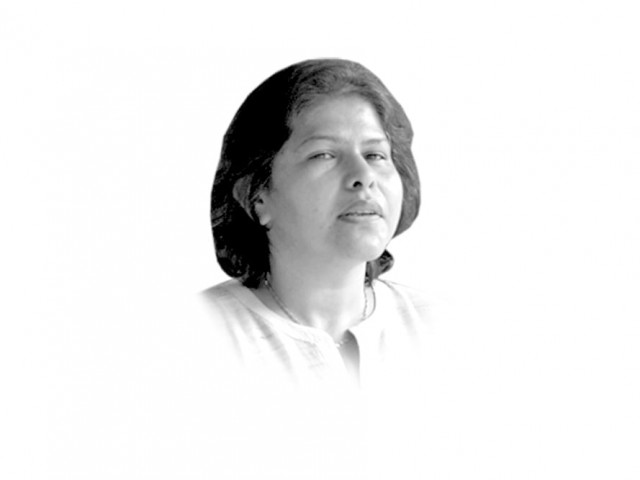Defending the State
Religious states like Israel use religion as equivalent of ethnicity. Protecting such states becomes a religious ideal

Defending the State
However, the more critical factor is that the violence may be unending since Hamas, which was earlier losing ground, may use the operation to consolidate itself and gather support. It was responsible for killing three Israeli teenagers that then started a spiral of violence. The Israeli forces went out of control in pursuing the killers and teaching them a lesson. Tel Aviv probably feels justified in the reaction of its security forces because it understands that the popular narrative is that a state is justified in taking any measures to protect itself. A number of Muslim countries are currently engaged in suppressing insurgencies. We, in Pakistan, have even proudly allowed foreign journalists to argue that the violence by a victim is the same as that by perpetrators of violence. Such a narrative was sold in recent years in explaining the history of the civil war in East Pakistan and now Bangladesh. We are, in fact, involved in an operation to protect the state.
Notwithstanding that many will get incensed at the idea of equating the two military operations, the fact is that an important question needs to be asked about how far should a state be allowed to go in reacting to violence? The nation-state all over the world continues to live but it has become a weak formula which, at different places, does not capture imagination of the people. The conflict that ensues between groups of people and the state often gets very violent. The question, is how far should both the state and non-state go?
Another important lesson that we can learn from the Gaza tragedy is how religious nationalism essentially legitimises brutality. A religious state like Israel tends to use religion as the equivalent of ethnicity. Protecting such a state then becomes a religious ideal that, in turn, means justifying any form of oppression. All religious states tend to suffer from this problem. In Israel’s case, religion and nationalism have become tightly intertwined. So, according to Israeli sociologist Uri Ram, the “state and the synagogue” are enmeshed. The state, in fact, draws its force from and cannot operate without the latter. The state has over the years produced a version of religious nationalism that dilutes secularism in the society.
According to a 2004 survey, about 44 per cent Israelis listed themselves as secular. In a 1999 survey, 43 per cent of people claimed they were non-religious and another five per cent as anti-religious. But the bigger problem is that such secularism is very individual and confined to personal life and choices. Secularism as a concept fails politically because, as Ram states “failure of secularism in Israel is anchored in the domain of its collective identity”. If we were to go by Jose Casanova’s definition of secularism as having three distinct levels: the decline of religious beliefs and practices, the privatisation of religion and the differentiation of the secular spheres, then in Israel the process has been limited to the first level. Secularism is limited to lifestyle and not political choices because of the structure of the state itself. It is important to note that Zionism was essentially non-religious as it aimed to create a nationalist movement by taking on board even the atheists who later turned into liberal-nationalists. The immigrants from Eastern Europe saw ‘Rabbinic Judaism’ as a hindrance against the new nationalism and even defied Rabbinical authority. However, this began to change. In order to find a nationalism that would gel the various groups and consolidate the state, the founding leader and the first Prime Minister of Israel, David Ben-Gurion, selectively used Jewish religious culture to fit and create a state-centrist ideology. For example, it was the state which guaranteed sanctity of the Sabbath as an official holiday. Moreover, to integrate the varied types of immigrants and to narrow the social and cultural gaps between these diverse groups the Jewish religious culture was considered as the common denominator.
The history of the evolution of the Israeli state and society is important in understanding how gradually ‘Jewish-Israeli’ identity became synonymous with, as Ian Lustic puts, it ‘becoming a non-Arab. The state integrated others such as the non-Jewish Russian immigrants (300,000 out of one million who were not considered strictly Jewish in religious terms) to strengthen state nationalism. Such demographic conversion was meant to counter the Arabs that were considered a threat. But with enhanced nationalism also came a sense of victimhood that was justified in the light of the several Arab-Israeli wars. In addition, uncomfortable with its dependence on foreign political powers, Israel acquired technology and weapons of destruction and means of oppression that were justified on the grounds of safeguarding a historical religious nationalist experiment.
It is almost as if the international community is not ready to take responsibility for solving a territorial crisis which was turned ideological by no one else but the state of Israel. However, what Tel Aviv must appreciate is that turning the battle more ideological will not bring peace or stability to itself and the region at large.
Published in The Express Tribune, July 17th, 2014.
Like Opinion & Editorial on Facebook, follow @ETOpEd on Twitter to receive all updates on all our daily pieces.














COMMENTS
Comments are moderated and generally will be posted if they are on-topic and not abusive.
For more information, please see our Comments FAQ